SAIC Motor ranks 52nd among Fortune Global 500
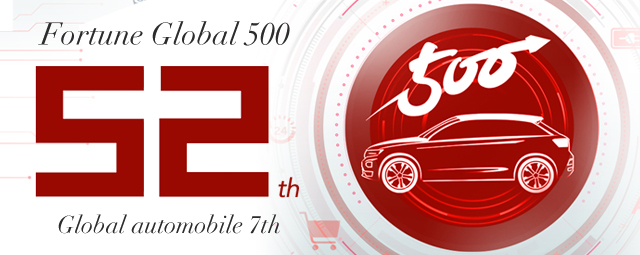
With a consolidated sales revenue of $122.0714 billion, SAIC Motor took the 52nd place on the 2020 Fortune Global 500 list released on Aug 10.
The company, which has made the top 100 rankings for seven consecutive years, was ranked 7th among all auto makers listed.
With the COVID-19 pandemic posing challenges to the global economy and auto industry this year, SAIC Motor has been striving to maintain economic operations and accelerate its innovative development strategy in the fields of Electrification, Intelligence and Connectivity, Sharing and Globalization.
Over the past four months, SAIC Motor has seen continuous sales growth. In July, the sales of new energy vehicles increased by 52.8 percent year-on-year and the total commercial mileage of fuel cell vehicles exceeded 4.5 million kilometers. From January to July, the overseas sales of its own brands increased by 15.9 percent. Meanwhile, MG maintained its position as the top single brand in exports in China.
The company will launch the world's first fuel cell MPV this year and its “5G+L4” smart autonomous heavy trucks have started quasi-commercial operations. These trucks will transport 20,000 containers within the year and help increase the traffic capacity of the Donghai Bridge by 100 percent in the future.
With a goal of meeting the new development trend of “software defines cars”, SAIC Motor set up a software center to aggregate the world’s top intelligent network talent teams. The cumulative registered users of its ride-hailing app Xiangdao’s has exceeded 10 million, with a user satisfaction rate of 97 percent.
SAIC Motor's subsidiaries include SAIC Passenger Vehicle Branch, SAIC Maxus, SAIC Volkswagen, SAIC General Motors, SAIC-GM-Wuling, NAVECO, SAIC-IVECO Hongyan and Sunwin.
Maintaining a leading position in the auto industry
The company’s retail sales turned positive in April and its domestic wholesale sales followed suit in May. Global wholesale sales in June then increased by 2.8 percent year-on-year. In July, SAIC Motor achieved global wholesale sales of 458,000 vehicles, an increase of 4 percent year-on-year. With its economic operations continuing to improve, SAIC Motor has maintained its leading position in the auto industry.
In July, SAIC passenger vehicle brands Roewe and MG completed sales of 56,000 vehicles around the world, achieving positive year-on-year growth. SAIC Maxus achieved sales of 15,600 vehicles, a year-on-year increase of 39.7 percent, while the sales of Maxus wide-body light buses saw a sharp increase of 165.9 percent, maintaining its position as the leader in the market segment.
Meanwhile, SAIC Volkswagen sold 134,000 vehicles in July, and its terminal retail continued to improve, allowing the Volkswagen brand to remain as the leader of single car brands. The sales of the Volkswagen brand SUV Family also increased by 25.8 percent year-on-year.
SAIC-GM sold 113,000 vehicles in July, achieving year-on-year growth. Among them, Buick sales increased by 36.6 percent year-on-year.
SAIC-GM-Wuling sold 130,000 vehicles in July, a year-on-year increase of 19.8 percent. Monthly sales of the Wuling brand approached 100,000, a year-on-year increase of 50 percent. The sales of Hongyan increased by 62 percent year-on-year.
New energy auto sales increased
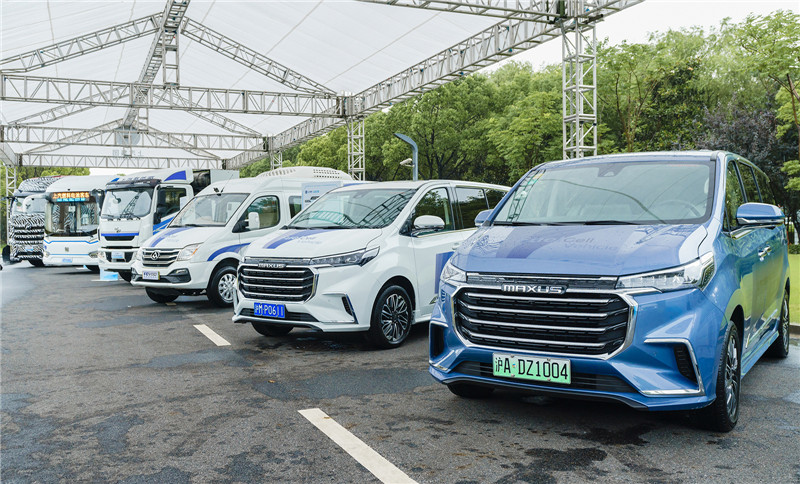
As the domestic "new energy triathlon champion", SAIC has world-class R&D capabilities for the three technical routes of "pure electricity, plug-in electricity, and fuel cell". From January to July, SAIC's new energy vehicle sales reached 79,000, outperforming the broader market and ranking among the top five in the global new energy vehicle market. The sales of SAIC's new energy vehicles in July exceeded 20,000, a year-on-year increase of 52.8 percent.
Fuel cell vehicles are considered to be the "ultimate goal" of new energy vehicles and a long-term strategic project for major global auto companies. However, there are currently very few fuel cell vehicle products that can truly achieve commercial operation.
SAIC has been investing in and actively tackling key problems in the field of fuel cells since 2001, leading the world in technology and commercial operations. At the 2010 Shanghai World Expo, through cooperation with domestic and foreign scientific research institutes, SAIC successfully realized the trial operation of thousands of new energy vehicles, including fuel cell vehicles, for half a year, setting a good and stable safe operation record worldwide.
In 2018, SAIC Motor established Shanghai Hydrogen Propulsion Technology Co Ltd to further accelerate the research on independent core technologies of fuel cells. At present, SAIC's fuel cell cars, MPVs, light trucks, light buses and buses have all been commercialized, with a total operating mileage of more than 4.5 million kilometers, making it the only company in the global automotive industry to achieve commercialization of multiple types of fuel cell vehicles.
The latest self-developed fuel cell MPV model, the SAIC Maxus EUNIQ 7 fuel cell vehicle, will be launched within the year. The first of its kind in the world, the vehicle is equipped with the third-generation fuel cell system PROME P390 of Hydrogen Propulsion, and is the first to apply a 70MPa hydrogen cylinder hydrogen supply system in China. Compared with the 35MPa hydrogen cylinder commonly used in China, 70MPa is lighter and has a larger capacity. The EUNIQ 7 fuel cell vehicle has a stack power of 115kW and a volumetric power density of 3.1kW/L. The key indicators are comparable to the world's top industry levels set by Toyota and Hyundai. The EUNIQ 7 has also successfully overcome the industry problem of low-temperature cold start and can achieve normal operations at -30℃. Hydrogenation can be completed within five minutes and comprehensive cruising range is 605 kilometers.
Smart heavy duty truck under quasi-commercial operations
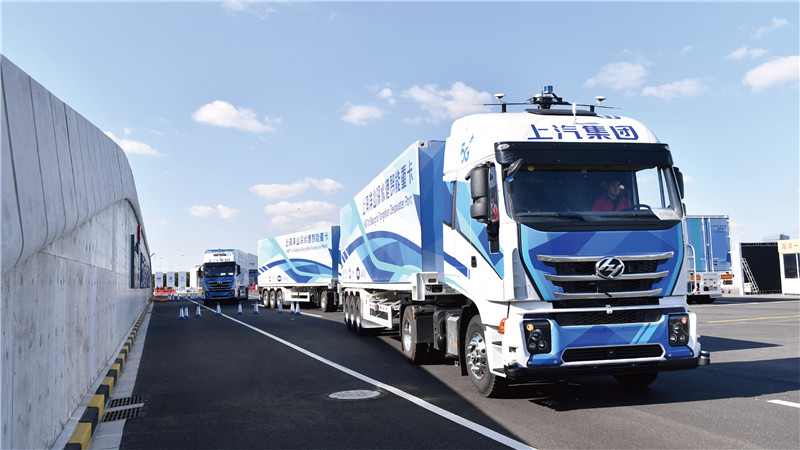
Last year, the world's first trial operation of "5G+L4” smart autonomous heavy truck was officially launched in Shanghai Yangshan Port. Combining advanced technologies such as Beidou navigation and positioning, AI, 5G and V2X, the truck successfully performed L4 autonomous driving, centimeter-level positioning, precise parking (±3cm) and interaction with automated port machinery equipment. The vehicle will enable port transportation to become smarter, safer, more efficient and more environmentally friendly.
Since the beginning of this year, through the comprehensive optimization of multiple goals such as vehicle speed, path and trailer angle, the smart heavy trucks have attained precise reversing functions. For heavy trucks with a length of more than ten meters, the overall reverse stall parking success rate is as high as 100 percent in a narrow parking space. Average reversing time is 70 seconds, exceeding the efficiency and accuracy of skilled drivers.
On the Donghai Bridge, five smart heavy trucks can drive in a convoy at a speed of 60-80 km/h, with the distance between trucks reduced to 15-18 meters, thus increasing the density of road vehicles while ensuring safety. The future goal of SAIC smart heavy trucks is to increase the traffic capacity of the Donghai Bridge by 100 percent.
At present, the road test mileage of SAIC smart heavy trucks has exceeded 90,000 kilometers, and the virtual simulation test mileage of benches has exceeded 5.7 million kilometers. Quasi-commercial operations of the trucks have started this year and 20,000 standard containers will be transported within the year.
With a focus on software development, SAIC Motor officially established a software center this year and is actively building a talent pool in the field of intelligent network. In the future, it will actively develop core businesses around the new-generation centralized electronic architecture, SOA (service-oriented architecture) software platform, automotive big data platform, data and network security, smart cab system and other fields. By integrating innovative achievements of the software R&D departments and subordinate enterprises of SAIC Motor, the company will accelerate in-depth integration and development of intelligent network technologies, and promote the implementation and application of projects with high quality and efficiency.
Ride-hailing services become more popular
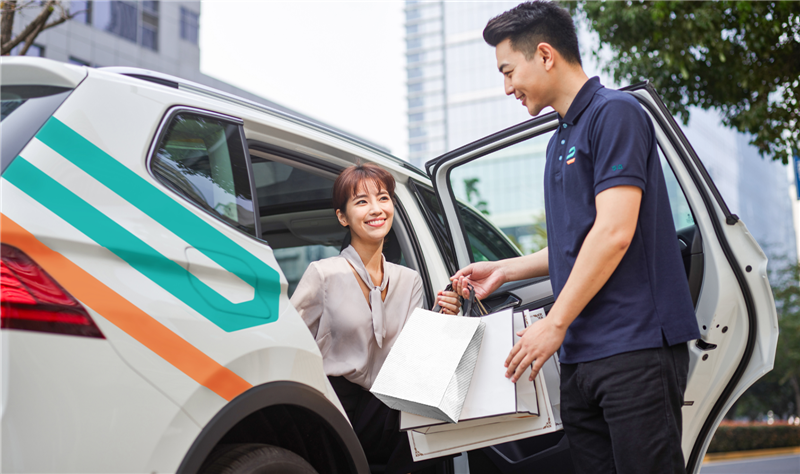
As a strategic mobile travel brand of SAIC Motor, ride-hailing app Xiangdao Chuxing has innovatively created an overall solution for the online car-hailing business, including technology platforms, vehicle operation, repairs and maintenance, financial credit, professional insurance. The company has launched a subsidiary brand Xiangdao Zuche that focuses on enterprise-level travel so as to explore the coordinated development of enterprise-level car rental business and personal car business and provide users with diversified and high-quality travel services.
In the one and a half years following its official launch in December 2018, Xiangdao Chuxing has been made available in cities including Shanghai, Zhengzhou, Suzhou, Kunshan, Hangzhou, Ningbo, Shaoxing and Wuxi, garnering more than 10 million registered users and a user satisfaction rate as high as 97 percent. Its market share in the private cars segment in Shanghai, Zhengzhou and Suzhou ranks among the top three. Xiangdao Zuche, which was launched only one year ago, currently has more than 1,500 corporate customers. Its overall business has also achieved significant growth.
Overseas businesses continue to grow
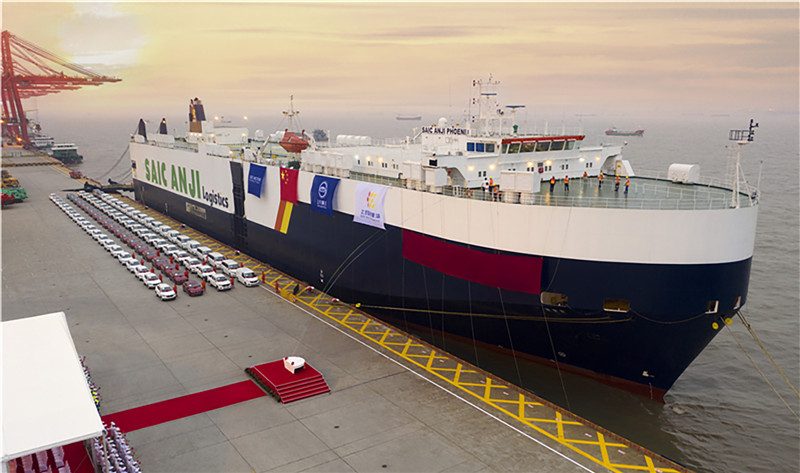
As China's first auto company to go global, SAIC has built a complete value chain for the automotive industry overseas, including innovative R&D centers, production bases, marketing centers, supply chain centers and financial companies.
It has sold products and services to more than 60 countries and regions around the world, created more than 750 overseas marketing service outlets and formed seven "scale-level" overseas markets in Thailand, the United Kingdom, Indonesia, Chile, Australia, New Zealand, the Middle East and India. SAIC's Huayu Components has 95 overseas bases. Anji's overseas full-value chain automotive logistics business covers nearly 40 countries, and Wuling Indonesia Diversified Finance Corporation is providing auto financial loans and insurance services to local dealers and end consumers.
In the face of the epidemic, SAIC's overseas teams are actively carrying out public welfare activities to enhance brand image while preventing the epidemic. Efforts have been made to speed up the expansion of overseas marketing networks, large-scale entry of new energy vehicles into Europe and strengthening digital marketing. The number of overseas social media fans for MG exceeded 4.45 million and MG has seen a rise in overseas market share.
From January to July this year, SAIC Motor achieved overall overseas sales of 154,000 vehicles, continuing to rank first in the domestic auto industry and accounting for one third of the total overseas sales of Chinese automakers. “For every three Chinese cars sold overseas, one is made by SAIC.” The overall overseas sales of SAIC's own brands reached 94,000 vehicles, an increase of 15.9 percent. MG is still the top single brand in exports in China.
Since last year, SAIC MG, Maxus and other self-owned new energy vehicle brands have entered the European market, including the United Kingdom, the Netherlands, Norway, Iceland and Germany, and have been well-received by local consumers. In the second half of last year, MG EZS achieved a single model export of 10,000 units to Europe. This year, SAIC's new energy vehicles will also enter European countries such as Spain and Switzerland. In Europe, the safety, life and mileage of SAIC's new energy vehicle batteries are industry-leading, which is the biggest reason behind their growing sales. In December 2019, the MG HS and the pure electric MG EZS received the highest level of ENCAP five-star safety evaluation. The pure electric MG EZS became the first pure electric small SUV in Europe to meet the requirements, and the MG HS became the first domestic SUV to receive a five-star rating from Europe and Australia
With the current domestic economy recovering steadily, the auto industry is making every effort to overcome the impact of the epidemic and gradually return to the right track. In the second half of the year, SAIC will ensure stable and orderly production and operation, strengthen economic operation resilience, and continue to promote electricity, intelligent networking, sharing, and internationalization to provide strong support for starting a new round of innovative development.

